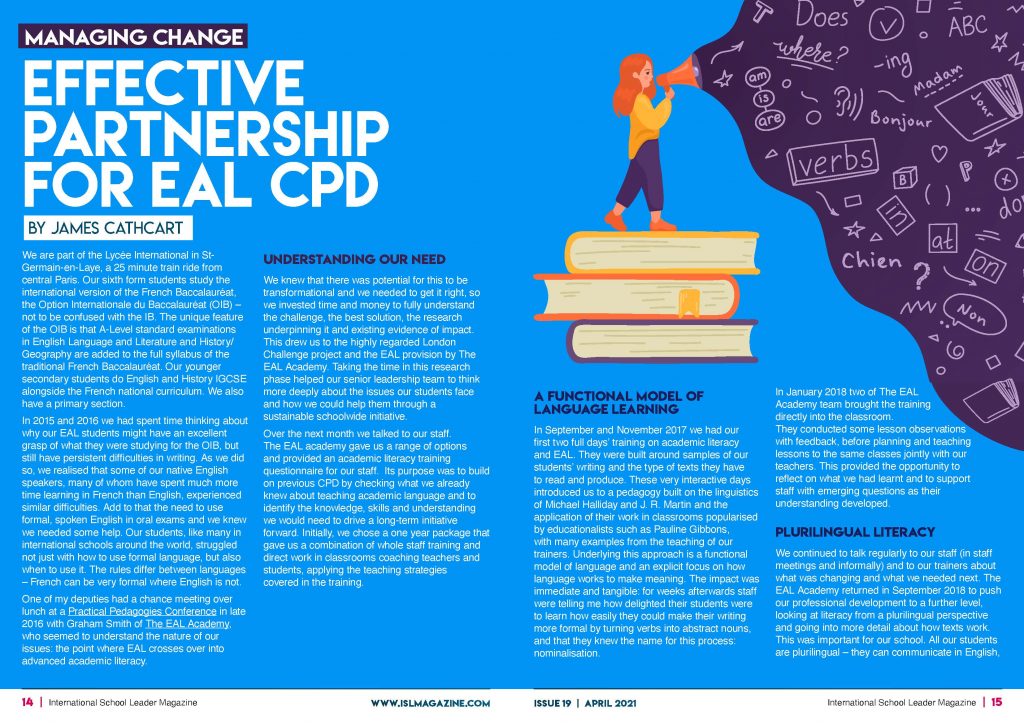EAL in international schools

Looking for guidance on how to best support the EAL learners in your international school?
You’ve come to the right place! In this section we offer examples of EAL best practice, courses and resources which are specific to international schools. We also share some frequently asked questions and insights relating to a range of EAL learners.
If you would like to discuss anything you read about here please get in touch.
Best practice examples
Our EAL Quality Mark award is popular among schools who want to:
– gain a clearer picture of the scope and success of their EAL provision
– identify gaps in their EAL provision and consider how to address them
Over 50 schools have achieved the EAL Quality Mark to date. Each term we invite some of our award winning schools to talk about their EAL provision on our free webinar.
Each webinar is recorded and, following the session, everyone who registers for the event is sent a link to the webinar recording and any resources presented.
We also share the details of the excellent practices demonstrated by the award winners on our News page. Click on the links below to read about some of our award winners for EAL in international schools.
Read about and hear from some of our award winning international schools:
Case studies
International school staff share some of the strategies successfully employed in their schools to support their EAL learners.
How an emphasis on speaking and listening leads to high levels of literacy
Sara Beddoes – International Section at the Collège, Lycée, Prépas Sainte Anne in Brest
Embedding a successful approach to EAL across the school
Gary Crick – Head of Learning Support at The International School @ Park City, Kuala Lumpur
The experience of a young refugee growing up in Denmark and the UK (in Danish)
Mona Bani – Director of Revoke, advocating for the rights and welfare of young refugees and asylum seekers
A UK prep school overcomes multilingual challenges similar to those encountered in an international school context Sara Lozano-Arcas – St Andrews Preparatory School, Eastbourne, UK
Our work with the British Section at the Lycée International, Saint Germain-en-Laye
Following a day long interview/planning session with the school leaders we designed a two year academic literacy programme for all secondary teachers, including training, in class coaching and joint classroom resources development.
We went on to provide training and a handbook for History and Geography teachers across the ASIBA group of schools. Most recently we have worked with primary teachers on assessment frameworks and developing a curriculum which supports pupils to read and write the key text types (or genres) they will encounter.

Read James Cathcart’s article about our work together in International School Leader Magazine (April 2021)
Courses
Most of our courses are relevant across phases and we have some excellent courses specifically tailored for EAL in international schools.

Learning in multilingual classrooms
Online course
This course looks at the choices we make about which language to use and the ability of many pupils to operate effectively in two or more languages.

EAL in an international school context
Online course
This course looks at some key aspects of EAL provision, such as the range of assessment arrangements and the falling number of native English speakers able to provide good models of English, from an international school perspective.

Leading EAL in primary schools
Online course
This 12-hour course aims to develop the leadership of EAL in primary schools where there are increasing numbers of pupils learning English as an additional language. Focusing on a whole school approach, the course provides guidance on how to plan and prioritise provision for a range of EAL learners.

Leading EAL in secondary schools
Online course
This 12-hour course aims to develop the leadership of EAL in secondary schools where there are increasing numbers of English as an additional language students. Focusing on a whole school and subject-based approach, the course provides guidance on how to plan and prioritise provision for a range of EAL learners.
Check out our full range of online EAL courses including SEND, primary and secondary options.
Looking for an extended EAL course?
We offer a six month, part time course covering a range of EAL topics.
Resources
We share a range of useful tools, articles and data in our free downloads library.
Our collection of EAL data, templates, articles and resources are largely relevant across all phases.
EAL Handbook
Our popular EAL Handbook (available in hard copy or in pdf format) is relevant across all phases and has a specific section on new arrivals at different phases of education:
– The early years
– Key stages 1 and 2
– Non-literate new arrivals
– Speaking and listening with Year Two pupils
– Key stages 3 and 4
Free downloads for EAL in secondary:

What our clients say

Frequently asked questions
What do I do with a new arrival in my classroom who doesn’t understand anything I say in English?
My EAL pupils speak English well and with a good local accent, but as soon as they start writing it’s obvious English is not their first language. What do I do?
How do I ensure my school has systems that help new arrivals fit in and make a flying start?
My pupils write reasonably in English, but it is obvious they don’t understand how academic English works. What do I do?
Do you have any questions?
Lorem ipsum dolor sit amet, consectetur adipiscing elit. Ut elit tellus, luctus nec ullamcorper mattis, pulvinar dapibus leo.

